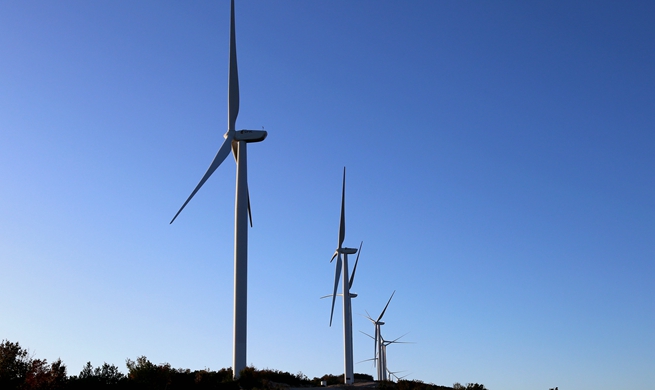LONDON, Nov. 20 (Xinhua) -- The future of the United Kingdom (UK) is at stake as the country is bracing for a "historic" general election on Dec. 12 where Brexit will be the main issue.
With different parties bidding on different approaches to the UK's place in, or out of, the European Union (EU), the stakes of the elections could not be higher, experts have said.
"This is truly a historic election for Britain's future political economy and for its diplomacy," said Tim Bale, deputy director at the UK in a Changing Europe initiative and professor of politics at Queen Mary University of London.
"This election, really, is absolutely crucial for the future of the UK and Brexit," Bale said in an exclusive interview with Xinhua.
POLARIZED POLITICS
Ever since the UK voted in a referendum in 2016 to leave the EU, the country's politics has become increasingly polarized.
If Prime Minister Boris Johnson's Conservative Party wins with a comfortable majority, the UK will very likely enter a transition phase and negotiations will start with the EU for a free trade agreement, Bale said.
"Clearly for the Conservatives, this election will all be about Brexit, and Boris Johnson's promise to get Brexit done," he said.
But other possibilities remain on the table.
"If we get a hung Parliament and Labour (the UK's main opposition party) manages to form a government, a minority government, with the support of other parties then we'll have a second referendum and we may never leave."
The handling of Brexit by Parliament has massively polarized the country's voters. Bale fears that the upcoming general election could deepen the internal division further.
"Clearly, if Boris Johnson manages to win the election with a majority and is able to push through the Withdrawal Agreement then, to some extent, I think the country will have to think about how it best gets back together."
"The complicating factor in that is that once we have left the EU, we'll then have to negotiate a free trade agreement with the EU. That could, of course, cause all sorts of disagreements, and the current disagreements we have, to escalate. I don't think there's any sense in which this general election will heal any wounds," said the professor.
"It is difficult to imagine how the UK could become more polarized than it's become since the Brexit referendum. I think that whether we continue to be as divided or more divided than we already are rather depends on the result of the election," he said.
MORE FRAGMENTED
The last time Britain held a general election was in 2017, one year after the Brexit referendum. Bale believes that much has changed in Britain's style of politics since then.
Not only has the country's political rulebook been rewritten, a new approach to politics is also being felt in the campaigning behavior of parties ahead of the election.
Three opposition parties: Labour, the Scottish National Party (SNP) and the Liberal Democrats have suggested a pre-electoral pact to fight the incumbent Conservatives. Whereas the Brexit Party, a recently founded entity built upon the desire to take the UK out of the EU at any cost, has announced that it is willing to form an electoral pact with the Conservatives to unite the "leave" vote, even though it says the current revised Brexit plan is a bad deal.
"It's actually very unusual in the UK for parties to form pre-electoral pacts with each other. I think you can understand why Boris Johnson and Nigel Farage (leader of the Brexit Party) have come to some kind of understanding -- primarily because part of Boris Johnson's wish is to unite the 'leavel' vote behind the Conservatives."
"The ironic thing about Brexit is that it actually has made our politics more European than British," Bale said.
According to the professor, Britain is very much used to having a two-party system, or a two-and-a-half party system, but right now, as in many other European countries, the British party system is "very fragmented."
"We have the Brexit Party and many other parties at play now. It's a very fragmented scene. Now whether during the general election that changes, and we see the two parties squeeze the smaller parties, and in fact come out -- as they did in 2017 -- with a much bigger share of the vote, we're yet to see."
UNCERTAIN OUTCOME
There is still much uncertainty surrounding the outcome of the December general election. What will worry the EU is that a new government could completely change the course of Brexit, potentially seeing an already agreed Brexit Withdrawal Agreement -- which took months to agree upon -- being scrapped and the UK changing its mind on leaving.
With a range of possible outcomes to this general election, Professor Bale believes that the truly worst outcome for the UK would be one which would bring yet more uncertainty.
"Some people would say that the worst outcome of the election would be an indeterminate result with a hung Parliament," he said.
"But I think it rather depends on who becomes the government in that hung Parliament. If you get a minority Labour government, for example, backed by the SNP and the Liberal Democrats, we would I think see a second referendum and that may put an end to the whole Brexit saga -- possibly."
With continuing uncertainty, Bale believes that Britain's handling of Brexit has shaken the country's global reputation of being "pragmatic and efficient."
Bale believes that the upcoming election could potentially help with stabilizing the country's reputation, but only if the political parties can come to an agreement to move on.
"It could be the case that once we get ourselves together perhaps if we get a free trade deal arrangement with Europe and we manage to do deals with other countries then we can put all this behind us."













